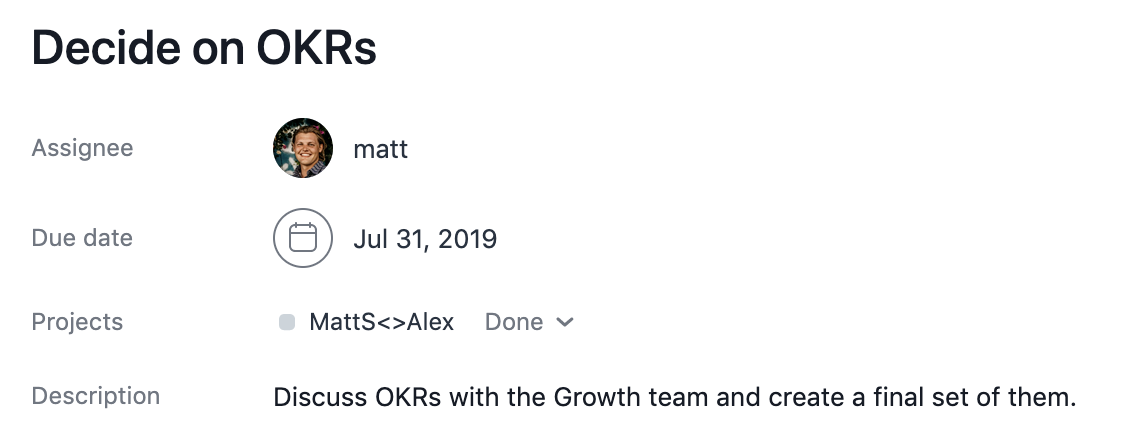Every day hundreds of agreements are made at Clearbit. These agreements are a key part of what makes Clearbit work. Agreements are made between two people (e.g., “I agree to complete project X by date Y”) or with yourself (e.g., “I'm going to exercise three days a week”).
It's important that we can trust each other to keep to our agreements. Imagine what would happen if we only kept to 80% of our agreements. You could safely assume that two out of ten agreements wouldn't be kept, but which two? You'd have to continually follow up and check on each agreement to see whether it had been missed or forgotten.
There's an automatic price you pay when you break an agreement: you disintegrate trust. The more agreements you break, the more you gain a reputation as someone who's unreliable. And unreliable people aren't trusted with important work.
This goes for agreements with others, but also for agreements with yourself. Think about the last agreement you broke with yourself. How does that make you feel? Anger? Shame? The story you should want to believe about yourself is that you are a reliable person who can achieve anything you set your mind to.
So, what's the solution? Impeccable agreements.
What is an “impeccable agreement”?
Every agreement between people at Clearbit should be impeccable. An impeccable agreement has the following properties:
- It is recorded (we use Asana).
- It is precisely defined (i.e., it has a comprehensive description, such that a third party could adjudicate if it was finished).
- It has a specific due date.
- It has a specific owner (or DRI - directly responsible individual). It’s important that there’s just one owner; tasks owned by multiple people are owned by nobody.
An example of an impeccable agreement would be the following task in Asana.

Keeping an impeccable agreement means that we do everything we say we are going to do or we renegotiate the agreement if we no longer want to keep it.
Since we are now committed to keeping our agreements, it's now important to be careful about the things we say “yes” to. Don't agree to too many things, stretching yourself in a way that will result in broken agreements.
Renegotiating agreements
Life happens, priorities change, and sometimes agreements can't be kept. That's okay. The key is to renegotiate agreements as soon as you know you can't keep them. Contact the person you made the agreement with and explain the situation. Either push back the due date or cancel the agreement completely.
When and how you try to renegotiate an agreement can make a big difference (e.g., realizing the day before the due date that a big project isn't going to make it on time versus being able to spot this coming in advance).
What happens when agreements are broken
If an impeccable agreement has been broken without being renegotiated, there must be consequences.
“The first time someone doesn’t meet an agreement, you point it out to them immediately. If they apologize, you respond that apologies are not needed, and all that is required is that they only make agreements that they can commit to and that they meet all the agreements they make. If the person continues to fail at these, there is only one consequence that makes sense: they can no longer be part of the company.”
- Matt Mochary, The Great CEO Within
Usually, when agreements are broken, there is a root cause, like poor prioritization. In these cases, we suggest creating a habit to make sure it never happens again; for example, adding a Top Task calendar event for an hour every day to ensure that important things get done. Another option is making this calendar event task specific, which is especially relevant for longer tasks.
Creating an accountability cadence
A great place to get people into the habit of keeping to their agreements is during their scheduled one-on-one. Run through their agreements (tasks assigned to them in Asana) and ensure that they've been kept.
Read more in our Running one-on-ones section.
Agreements with yourself
Keeping agreements with yourself is just as important as keeping agreements with others. Otherwise, how are you going to achieve your dreams and reach your potential? These tasks may seem small and insignificant, but every great journey starts with a single step.
By making small agreements with yourself, achieving them, and then making larger ones, you will start to develop a mindset that you can achieve anything you set your mind to. You will find that this is an incredibly powerful story to believe about yourself, and this will lead to greater success and personal happiness.
You can keep personal agreements either in Asana or in a personal to-do list like Things.